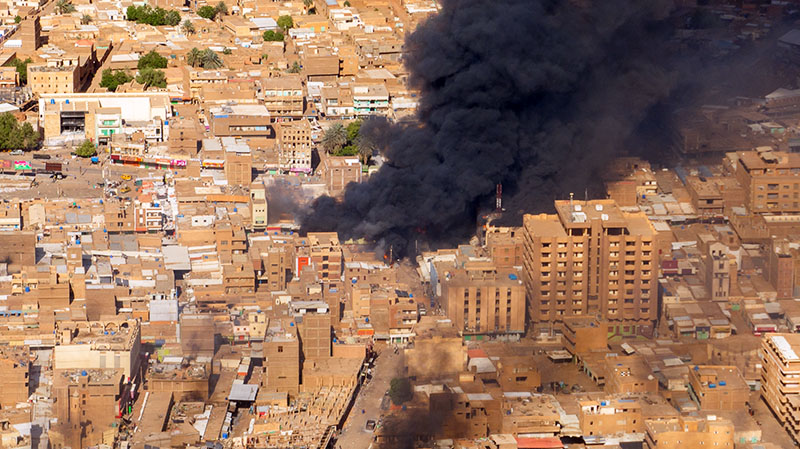Sudan’s civil war has escalated dramatically during the course of the past year and according to the United Nations the situation is rapidly becoming a “humanitarian crisis of epic proportions.” At present, 18 million people, nearly 40% of the total population are facing acute levels of hunger and are at risk of starvation. Over 8 million have so far left their homes, with 6.3 million internally displaced and another 1.7 million becoming international refugees in neighbouring countries. And the situation can only deteriorate, as long as foreign actors keep fuelling the conflict.
Fighting first broke out between the national army and the paramilitary Rapid Support Forces (RSF) on April 15, 2023, following the overthrow in 2019 of dictator Omar al-Bashir, who had ruled the country for three decades. The Sudanese army supports General Abdel Fattah al-Burhan, while the RSF is under the command of Mohamed Hamdan “Hemeti” Dagalo. The RSF is mostly made up of the former Janjaweed militias, and it previously fought in Darfur on behalf of the government, where its actions qualify as crimes against humanity according Human Rights Watch. The current round of fighting has officially killed at least 14,000 so far, though the real figure is certainly much higher.
There is ample evidence that right from the start of the conflict the RSF’s rebellion against the Sudanese army had the backing of Russia and the United Arab Emirates. Russian weapon systems, such as Kornet AT-14 antitank missiles and SAM-7 missiles, have been widely used by the rebels, and there are credible reports that the Russian Wagner Group and its successor organization, the Africa Corps, have been fighting alongside the RSF forces.
For many years, the RSF has financed its activities by selling gold and diamonds on the UAE commodities market through front companies and then funnelling the proceeds back into the global financial system, with the collusion of Emirati banks. In this regard, their takeover of the Jebel Amer gold mines in the Darfur region has been hugely beneficial for the paramilitary group. Documents uncovered by Global Witness reporters reveal that in the first six months of 2019 alone, the RSF bought over 900 Toyota Hilux and Land Cruisers vehicles from dealers in the UAE. These are then shipped back to Sudan, and there converted into ‘technical’ – 4x4 military vehicles mounted with machine guns.
For its part, the UAE has denied involvement in the Sudanese civil war. However, a leaked report compiled for the UN Security Council proves that for the past year the Emirates have been shipping arms to the RSF “several times per week.” In May-June 2023 alone, there were 69 heavy-lift cargo flights between Emirati military airfields and Amdjarass, a city in Chad near the border of the RSF controlled Darfur region. In response to the accusations, the UAE’s Foreign Ministry responded that the purpose of the flights was to install a tent hospital for refugees fleeing the war, but satellite imagery shows that said hospital would have taken at most five flights to deliver.
There are both economic and ideological motivations behind the UAE’s support for the RSF. Before the war, investors from the Emirates have bought large tracts of land and invested in goldmines in the portion of Sudan administered by the paramilitary group. As such, Hemeti is seen as guarantor of these investments, and if he comes out on top in the current struggle it would help cement Abu Dhabi’s position as a key player in the African mineral trade.
Perhaps more importantly, Hemeti is relatively unencumbered with ideological baggage and more willing to accommodate his allies in this regard. By contrast, General Burhan has longstanding ties with the Muslim Brotherhood, and the Sudanese national army contains many elements sympathetic to the movement. Given that both the domestic and the foreign policies of the Emirates are geared towards fighting the influence of the Brotherhood, it’s a no-brainer which side in the war the UAE is supporting.
Unfortunately, pursuit of these geopolitical goals translates into suffering and death for countless civilians. Both sides have committed war crimes, but the RSF in particular has engaged in large scale ethnic cleansing in the parts of the country it controls. In an echo of the Darfur genocide, during the battle for the city of Geneina the paramilitary group massacred thousands of non-Arab civilians from the Masalit tribe. According the annual report of the UN Security Council, “the attacks were planned, coordinated, and executed by RSF and their allied Arab militias.”
With the Gaza and Ukraine wars raging, the Sudan crisis has remained largely outside the media spotlight and little public discussion has occurred about what is required to mitigate the looming humanitarian disaster. It’s obvious, however, that in order to stem the tide of violence and bring about a negotiated cessation of hostilities, the international community needs to take swift steps to limit the RSF’s access to weapons and funding. Engagement on this matter with the Emirati officials responsible for foreign policy should be prioritised, and sanctions may prove a useful motivator in encouraging the UAE to stop enabling crimes against humanity in Sudan.









